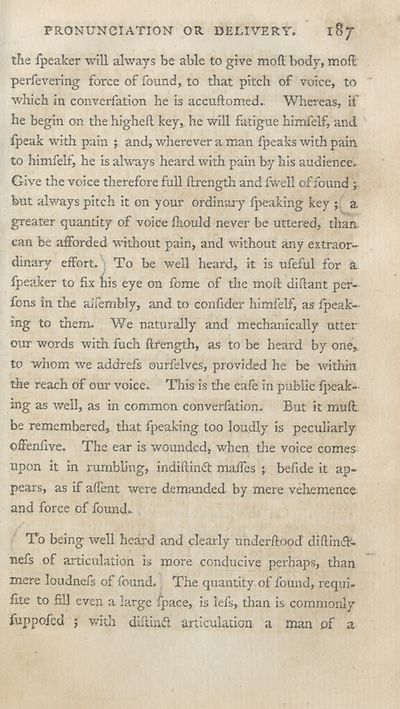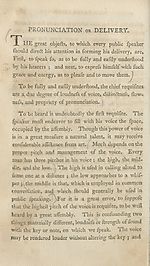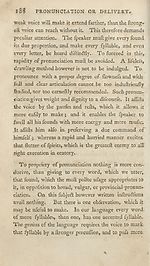Download files
Complete book:
Individual page:
Thumbnail gallery: Grid view | List view

PRONUNCIATION OR DELIVERY. iS/
the fpeaker will always be able to give moft body, mofl:
perfevering force of found, to that pitch of voice, to
which in converfation he is accuftomed. Whereas, if
he begin on the highell key, he will fatigue himfelf, and
fpeak with pain ; and, wherever a man fpeaks with pain
to himfelf, he is always heard with pain by his audience.
Give the voice therefore full ftrength and fwell of found;
but always pitch it on your ordinary fpeaking key ; a
greater quantity of voice fhould never be uttered, than
can be afforded without pain, and without any extraor¬
dinary effort. To be well heard, it is ufeful for a
fpeaker to fix fiis eye on fome of the moft diftant per-
fons in the aifembly, and to confider himfelf, as fpeak¬
ing to them. We naturally and mechanically utter
our words with fuch ftrength, as to be heard by one,,
to whom we addrefs ourfelves, provided he be within
the reach of our voice* This is the cafe in public fpeak¬
ing as well, as in common converfation. But it muft
be remembered, that fpeaking too loudly is peculiarly
offenfive. The ear is wounded, when the voice comes
upon it in rumbling, indiftindt maffes ; befide it ap¬
pears, as if affent were demanded by mere vehemence
and force of found..
To being well heard and clearly underftood diftimft-
nefs of articulation is more conducive perhaps, than
mere loudnefs of found., The quantity of found, requi-
fite to fill even a large ipace, is lefs, than is commonly
fuppofed ; with diftinft articulation a man of a
the fpeaker will always be able to give moft body, mofl:
perfevering force of found, to that pitch of voice, to
which in converfation he is accuftomed. Whereas, if
he begin on the highell key, he will fatigue himfelf, and
fpeak with pain ; and, wherever a man fpeaks with pain
to himfelf, he is always heard with pain by his audience.
Give the voice therefore full ftrength and fwell of found;
but always pitch it on your ordinary fpeaking key ; a
greater quantity of voice fhould never be uttered, than
can be afforded without pain, and without any extraor¬
dinary effort. To be well heard, it is ufeful for a
fpeaker to fix fiis eye on fome of the moft diftant per-
fons in the aifembly, and to confider himfelf, as fpeak¬
ing to them. We naturally and mechanically utter
our words with fuch ftrength, as to be heard by one,,
to whom we addrefs ourfelves, provided he be within
the reach of our voice* This is the cafe in public fpeak¬
ing as well, as in common converfation. But it muft
be remembered, that fpeaking too loudly is peculiarly
offenfive. The ear is wounded, when the voice comes
upon it in rumbling, indiftindt maffes ; befide it ap¬
pears, as if affent were demanded by mere vehemence
and force of found..
To being well heard and clearly underftood diftimft-
nefs of articulation is more conducive perhaps, than
mere loudnefs of found., The quantity of found, requi-
fite to fill even a large ipace, is lefs, than is commonly
fuppofed ; with diftinft articulation a man of a
Set display mode to:
![]() Universal Viewer |
Universal Viewer | ![]() Mirador |
Large image | Transcription
Mirador |
Large image | Transcription
| Antiquarian books of Scotland > Languages & literature > Abridgement of lectures on rhetoric > (203) |
|---|
| Permanent URL | https://digital.nls.uk/135468890 |
|---|
| Description | Thousands of printed books from the Antiquarian Books of Scotland collection which dates from 1641 to the 1980s. The collection consists of 14,800 books which were published in Scotland or have a Scottish connection, e.g. through the author, printer or owner. Subjects covered include sport, education, diseases, adventure, occupations, Jacobites, politics and religion. Among the 29 languages represented are English, Gaelic, Italian, French, Russian and Swedish. |
|---|

